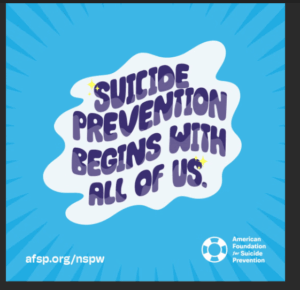Suicide Prevention Tips For Security Professional

As a security guard, you may encounter individuals experiencing a mental health crisis, including those who are contemplating suicide. These situations require extreme sensitivity, proper training, and a clear understanding of your role. Here are seven crucial things every security professional should know when faced with this challenging scenario.
1. Recognize the Warning Signs
Understanding the indicators of suicidal ideation can help you identify when someone needs immediate help. Common warning signs include:
Verbal cues such as “I wish I were dead,” “I can’t go on,” or “Everyone would be better off without me”
Behavioral changes like social withdrawal, giving away possessions, or sudden calmness after a period of depression
Physical signs including self-harm marks, extreme fatigue, or changes in appearance
Emotional indicators such as hopelessness, rage, anxiety, or feeling trapped
Being alert to these signs allows you to respond appropriately and potentially save a life.
2. Your Primary Role is Safety, Not Counseling
As a security guard, your main responsibility is to ensure the immediate safety of the individual and others around them. You are not expected to provide professional counseling or therapy. Your job is to:
Secure the area and remove potential hazards
Call for professional help immediately
Maintain a calm presence while waiting for trained professionals
Document the incident according to your company’s protocols
Remember that attempting to provide psychological counseling without proper training can inadvertently worsen the situation.
3. De-escalation Techniques Are Critical
When interacting with someone in crisis, your approach can significantly impact the outcome. Effective de-escalation involves:
Speaking in a calm, slow, and steady voice
Maintaining non-threatening body language with open palms and relaxed posture
Giving the person space while staying close enough to ensure safety
Using active listening techniques and acknowledging their feelings
Avoiding sudden movements or gestures that might be perceived as threatening
The goal is to create a sense of safety and connection until professional help arrives.
4. Know What NOT to Say
Certain phrases, though well-intentioned, can be harmful when speaking with someone who is suicidal. Avoid saying:
“You have so much to live for” or “Think about your family”
“Suicide is selfish” or “You’re being dramatic”
“I know exactly how you feel”
“Everything happens for a reason”
“Just think positive”
These statements can minimize their pain or make them feel guilty. Instead, focus on listening and validating their feelings without judgment.
5. Emergency Contacts and Protocols
Every security guard should have immediate access to emergency resources and know their company’s specific protocols for mental health crises. Essential contacts include:
Local emergency services (911 in the US)
Crisis hotlines such as the 988 Suicide & Crisis Lifeline
Your supervisor or security management
On-site mental health professionals if available
Local police crisis intervention teams
Familiarize yourself with these resources before you need them, and ensure your communication devices are always functional.
6. Documentation and Legal Considerations
Proper documentation is crucial for several reasons, including legal protection, incident analysis, and potential follow-up care. Your documentation should include:
Time, date, and location of the incident
Observed behaviors and statements (use direct quotes when possible)
Actions taken and emergency services contacted
Names of witnesses or other staff involved
Outcome and any follow-up required
Be objective and factual in your reporting, avoiding personal opinions or diagnoses. This documentation may be important for legal proceedings or insurance claims.
7. Self-Care and Professional Support
Dealing with suicidal individuals can be emotionally taxing and may affect your own mental health. It’s important to:
Recognize that these situations can be traumatic for responders
Seek debriefing or counseling support after critical incidents
Practice stress management techniques regularly
Know the signs of secondary trauma or compassion fatigue
Maintain boundaries between your professional and personal life
Many employers offer Employee Assistance Programs (EAPs) that provide confidential counseling services. Don’t hesitate to use these resources when needed.
Additional Considerations
Training and Certification
While basic security training may touch on crisis situations, consider pursuing additional certification in mental health first aid or crisis intervention. These specialized training programs can provide valuable skills and confidence when dealing with mental health emergencies.
Environmental Awareness
Be mindful of the environment when responding to a suicidal individual. Remove or secure potential means of self-harm, ensure privacy when possible, and create a calm atmosphere. Sometimes, simply changing the location to a quieter, less stimulating environment can help de-escalate the situation.
Cultural Sensitivity
Approach each situation with cultural competence and awareness. Different communities may have varying perspectives on mental health and suicide. Respect these differences while still prioritizing immediate safety and professional intervention.
Conclusion
Encountering someone who is suicidal is one of the most challenging situations a security guard may face. By understanding your role, knowing the proper protocols, and maintaining a compassionate but professional approach, you can help ensure the best possible outcome. Remember that your primary job is to keep everyone safe until trained mental health professionals can take over.
The most important thing to remember is that you don’t have to handle these situations alone, suicide prevention is a team effort. Professional help is available, and your quick thinking and appropriate response can make the difference between life and death. Stay informed, stay prepared, and never hesitate to call for backup when dealing with a mental health crisis.
If you or someone you know is struggling with suicidal thoughts, please reach out for help immediately. In the US, contact the 988 Suicide & Crisis Lifeline by calling or texting 988, or visit 988lifeline.org for additional resources. 988 has call takers trained in suicide prevention and would be able to assist.
#WorldSuicidePreventionDay Tip #1
References
The Importance of Security in Today’s World: Protecting People, Property, and Peace of Mind
Suicide Prevention – National Institute of Mental Health (NIMH)
Call2talk | United Way of Tri-County
Suicide Prevention Suicide Prevention Suicide Prevention Suicide Prevention Suicide Prevention Suicide Prevention
